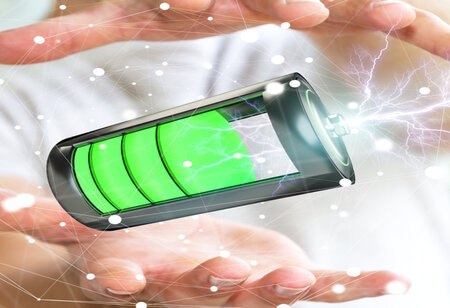Chinese Startup Betavolt's Nuclear Battery: 50 Years of Smartphone Power
By Consultants Review Team
 A Chinese startup, Betavolt, claims to have achieved a groundbreaking feat in energy innovation by developing a nuclear battery that can power smartphones continuously for an impressive 50 years without the need for charging. Represented as the world's first miniaturized atomic energy system, this technological breakthrough involves utilizing 63 nuclear isotopes packed into a module smaller than a coin.
A Chinese startup, Betavolt, claims to have achieved a groundbreaking feat in energy innovation by developing a nuclear battery that can power smartphones continuously for an impressive 50 years without the need for charging. Represented as the world's first miniaturized atomic energy system, this technological breakthrough involves utilizing 63 nuclear isotopes packed into a module smaller than a coin.
Betavolt's nuclear battery taps into the concept of converting energy released by decaying isotopes into electricity, a concept initially explored in the 20th century. The startup has successfully realized this idea and is currently conducting pilot testing with plans to mass-produce the battery for commercial applications, including smartphones and drones.
In a press release, Betavolt stated that their atomic energy batteries, which deliver 100 microwatts of power with a voltage of 3V, have the potential to meet the long-lasting power supply needs in various scenarios such as aerospace, AI equipment, medical devices, microprocessors, advanced sensors, small drones, and micro-robots. The company envisions this energy innovation providing China with a competitive edge in the evolving era of AI technology.
The initial nuclear battery, measuring a mere 15x15x5 cubic millimeters, is designed for safety and efficiency. Betavolt claims that its layered structure prevents the battery from catching fire or exploding when subjected to sudden force. Additionally, the battery exhibits operational stability within a wide temperature range, from -60 degrees Celsius to 120 degrees Celsius.
Betavolt's scientists utilized nickel-63, a radioactive element, as the energy source for the battery. The energy conversion process involves diamond semiconductors, where a thin single-crystal diamond semiconductor, only 10 microns thick, is used with a 2-micron-thick nickel-63 sheet placed between two diamond semiconductor converters. This setup converts the decay energy of the radioactive source into electrical current.
Addressing concerns related to radiation, Betavolt assures users of the battery's safety, emphasizing its suitability for use in medical devices inside the human body, such as pacemakers and cochlear implants. After the decay period, the 63 isotopes transform into a stable, non-radioactive isotope of copper, posing no environmental threat or pollution.
Betavolt's BV100 battery not only marks a significant advancement in nuclear battery technology but also ensures enhanced security compared to conventional batteries. It does not catch fire or explode when punctured or exposed to high temperatures, making it a safer alternative.
The development of miniaturized nuclear batteries has been a longstanding goal for scientists, and Betavolt's achievement represents a notable breakthrough. This technology has the potential to revolutionize the electronics industry, eliminating the need for chargers or portable power banks. Devices powered by these nuclear batteries could operate continuously without degradation in capacity or lifespan, offering a glimpse into a future with non-stop drones, phones that never need charging, and electric cars that require infrequent recharging. Betavolt's nuclear battery stands as a remarkable innovation with the promise of transforming the way we use and perceive electronic devices, ushering in an era of unlimited power supply.







